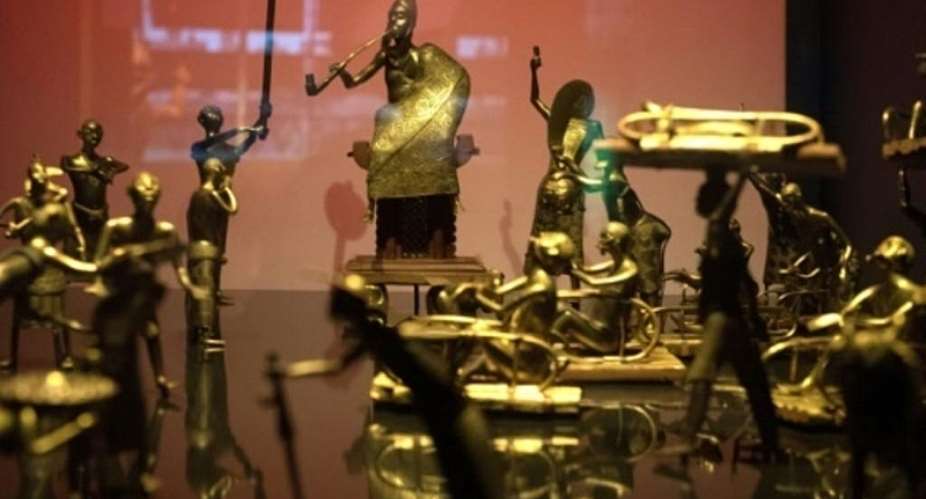The French National Assembly votes today on whether to return key works of art to Benin and Senegal, amid a wider debate over the restitution of artworks.
Many judge the move to be just a first step towards the rightful return of numerous works of art to their countries of origin. For others this restitution is the tip of an iceberg that could lead to the emptying of some of France's world famous museums.
The proposal before the French lower house today concerns artworks from western Africa, in line with President Macron's 2017 pledge in Ouagadougu to work towards creating the conditions for the restitution of African cultural treasures held in France.
Paris proposes the return to Benin of 26 pieces from the so-called “Treasure of Béhanzin”, seized by French troops when the Abomey Palace was pillaged in 1892 and currently held by the Quai Branly-Jacques Chirac in Paris.
Senegal would see the return of a sabre and its sheath, attributed to El Hadj Omar Tall, a key religious and military figure in western Africa in the 19th century. The sabre is part of the collection at the Museum of the Army in Paris but it is currently on long-term loan in Dakar.
'Strict minimum'
Mindful of the debate around the subject, French culture minister Roselyne Bachelot insists the proposed restitution of these particular artworks is “neither an act of repentance nor reparation, nor a condemnation of France's cultural model, but the beginning of a new chapter in cultural links between France and Africa.”
She told the French Commission for Cultural Affairs that returning the artworks allowed France to help “give the youth of Africa access to major pieces of their own heritage.”
Benin president Patrice Talon recognized what he described as “first steps” from Paris, but told the weekly magazine Jeune Afrique recently that today's proposal was not enough.
He said it was “a strict minimum”, and called for a general law allowing “a comprehensive return of artworks, based on a precise list”.
Growing demand for restitutions
But critics of today's bill fear that the return of these objects could trigger a wave of similar demands from other countries, complicating international relations.
“How are we going to refuse Egypt now? What about the artworks which were taken by Napolean, the crowning artefacts of some French museums?” wonders Yves-Bernard Debie, a lawyer specialising in cultural property.
A study prepared for MPs on the impact of returning artworks also raised concerns that the international art market might suffer as buyers worry about legal disagreements.
The question of restitution has gathered momentum in recent years and led many museums, many of which house artefacts stolen during conflicts, to examine their role.
Art Historian Julien Volper worries about the clamour for restitutions, pointing out in Tuesday's Le Figaro newspaper that all countries pillaged and looted during wars and that the practice was only declared a crime in 1899 as part of the Hague Convention.
France's minister of culture says the subject of returns raises “ethical, philosophical and political questions” but she recently reminded the Cultural Affairs Committee that Paris has already returned artworks to different countries, using various legal frameworks.
A statue stolen from Egypt was returned in 1981, 21 Maori heads have been sent back to New Zealand and 32 gold plaques were returned to China.
Meanwhile, French MP M'Jid El guerrab has put forward a new proposition, that the cloak which belonged to Emir Abdelkader, “a hero of Algerian resistance to colonization in the 19th century” be returned to Algiers from Paris.





 Election 2024: Ghanaians will vote to erase Akufo-Addo’s horrifying legacy – Nii...
Election 2024: Ghanaians will vote to erase Akufo-Addo’s horrifying legacy – Nii...
 BP killed ex-Weija-Gbawe MCE – Tina Mensah reveals
BP killed ex-Weija-Gbawe MCE – Tina Mensah reveals
 Limited voter registration exercise: NDC slams EC over mass technical challenges
Limited voter registration exercise: NDC slams EC over mass technical challenges
 UK, America will one day come to Ghana to borrow Akufo-Addo to be their presiden...
UK, America will one day come to Ghana to borrow Akufo-Addo to be their presiden...
 EOCO returns fire at OSP over Cecilia Abena Dapaah’s money laundering case
EOCO returns fire at OSP over Cecilia Abena Dapaah’s money laundering case
 Anti-corruption endeavours must be rooted in systems, investigations and prosecu...
Anti-corruption endeavours must be rooted in systems, investigations and prosecu...
 We’ve not introduced 1% cybersecurity levy on banking transactions – BoG
We’ve not introduced 1% cybersecurity levy on banking transactions – BoG
 EU hits out at sidelining of Chad election observers
EU hits out at sidelining of Chad election observers
 ‘Be calm; we’re having engagements on new fee implementation’ — KNUST SRC assure...
‘Be calm; we’re having engagements on new fee implementation’ — KNUST SRC assure...
 Bawumia is compassionate, unique politician without corruption tag — Miracles Ab...
Bawumia is compassionate, unique politician without corruption tag — Miracles Ab...
